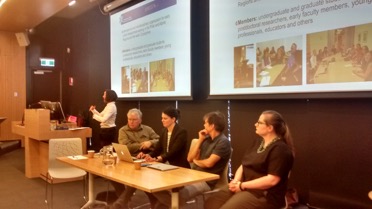
APECS in collaboration with the Marine Ecosystem of the Southern Ocean (MEASO) and the IDEAL research center of Chile held a panel in Hobart Australia on April 8th. This panel was one of several workshops preceding the first MEASO conference. The two hour event discussed how early career researchers (ECR) can get involved in large international initiatives that are shaping Antarctic research and policy. Our panel covered topics such as: advantages/disadvantages of being involved, when and how to get involved as an ECR and best ways to make an impact on politics. The panel consisted of: Dr. Aleks Terrauds (AAD and chair of SCAR standing committee on the ATS), Indi Hodgson-Johnston (IMOS and ECR rapporteur for ATS and CCAMLR), Dr. Nadine Johnston (BAS and ICED program manager) and Dr. Stephen Nicol (UTAS and Australian delegation to CCAMLR). The panel was moderated by APECS ExCom member Jilda Caccavo. Twenty-two ECRs attended the panel.


According to our panelists ECR should try to get involved with these initiatives as soon as possible. They highlighted the many advantages participating in these groups, and noted that the only downside is that it is time consuming and represents an extra workload during your PhD or post-doc. However, all the panelists agreed that being involved is an excellent way to raise your professional profile and increase the impact of your research. Involvement in these large international initiatives would also give you plenty of opportunities for networking and influencing policy. The panel noted that there are many ways to get involved as there are many different initiatives. . The panel recommend looking for a group that matches your interests, be thy research, policy or career development interests, and becoming involved. The group noted that most scientific meetings and the Antarctic Treaty System require rapporteurs for their large meetings. Rapporteuring is an excellent opportunity to become more actively involved in the groups, network, and learn the very useful (and marketable!) craft of writing reports. The panel highlighted that organizations differ in how easy it is to get involved. For example, CCAMLR is more political and participants in CCAMLR process need to be invited into the group. Invitations can take the form of CCAMLR scholarships, internships or jobs such as, rapporteuring. Other organizations, like ICED, are more open and you only need to browse through their website and register yourself to participate. Finally, being involved gives you an outstanding platform for your research to impact policy. Many of the scientific organizations (like SCAR and ICED) have an established reporting chain to political bodies such as, CCAMLR and the Antarctic Treaty Consultative Meeting. High quality research with a crystal clear message is always helpful to impact policy. It is also helpful to cultivate relationships with policy makers who can carry your message into the decision making processes. Maintaining these relationships is time consuming, but it is a very effective way to ensure that your science influences policy. A less direct, but also effective way to have your research message reach policy makers is to engage in outreach and publishing “non-academic” abstracts for larger audiences (e.g. twitter, websites, etc.).



Copyright © 2018 APECS China, All Rights Reserved. 鄂ICP备19017926号-2 https://beian.miit.gov.cn/